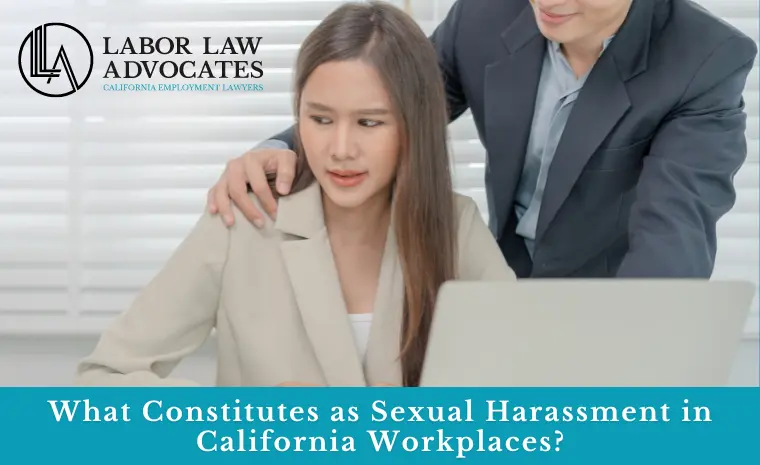What Constitutes as Sexual Harassment in California Workplaces?
Sexual harassment is an important topic that affects workplaces across the globe. In California, workplace environments are governed by specific laws and regulations that define what constitutes sexual harassment and outline the responsibilities of employers and employees. Understanding these definitions and guidelines is crucial for creating a safe and respectful workplace for everyone.
This article discusses the various aspects of sexual harassment in California workplaces, its definitions, legal implications, and ways to prevent it.
Defining Sexual Harassment
Sexual harassment in California workplaces is defined as unwelcome sexual advances, requests for sexual favors, and other verbal or physical conduct of a sexual nature. This can include explicit comments, gestures, or actions that create an uncomfortable or hostile environment for the victim.
Forms of Harassment in Workplaces
- Quid Pro Quo Harassment: It involves a situation where a person in a position of authority offers employment benefits, promotions, or other favorable treatment in exchange for sexual favors. This type of harassment creates an inherently coercive and exploitative dynamic.
- Hostile Work Environment Harassment: Also called offensive work environment, this is another form of sexual harassment, characterized by a behavior that interfere with an employee’s work performance due to their gender identity or sex. These incidents show misuse of position of power, such as making offensive comments, sexual jokes, explicit materials, or derogatory comments that make the workplace uncomfortable.
Did you experience sexual harassment at your workplace?
California’s Employment Laws Against Sexual Harassment
California has established robust employment laws to address sexual harassment and ensure a safe and inclusive work environment for all. From defining prohibited behaviors to outlining reporting procedures, these laws play a pivotal role in promoting accountability and fostering a culture of respect and equality in workplaces across the state.
The Fair Employment and Housing Act
The Fair Employment and Housing Act (FEHA) stands as a cornerstone in California’s legal framework for combating sexual harassment in the workplace. Enacted to promote equality and eradicate discrimination, it plays a key role in establishing guidelines, responsibilities, and protections related to California sexual harassment.
FEHA was enacted in 1959 to address issues of discrimination, including those related to sexual orientation, national origin, age, disability, medical condition, and other protected categories. Over the years, its scope expanded to include comprehensive measures against sexual harassment in workplaces. The act makes it unlawful to engage in discriminatory practices, including workplace harassment, which creates a hostile, offensive, or intimidating work environment.
Key provisions under FEHA include:
- Definition of Sexual Harassment: FEHA outlines a clear legal definition of sexual harassment, encompassing unwelcome sexual advances, requests for sexual favors, and other verbal or physical conduct of a sexual nature that interfere with an individual’s work performance or create a hostile work environment.
- Employer Responsibilities: FEHA mandates that employers take proactive steps to prevent and address sexual harassment. This includes establishing policies and procedures for reporting incidents, conducting thorough investigations, and implementing corrective actions when necessary.
- Protection Against Retaliation: FEHA safeguards employees from retaliation for reporting sexual harassment or participating in related investigations. Employers are prohibited from taking adverse actions against employees who assert their rights under the act.
- Statute of Limitations: There is a specific timeline within which victims must file a complaint. Generally, a victim has one year from the date of the alleged harassment to file a complaint with the California Department of Fair Employment and Housing (DFEH).
Title VII of the Civil Rights Act of 1964
Often referred to as Title VII, this California sexual harassment law establishes a stringent prohibition on workplace sexual harassment, irrespective of an individual’s gender, sex, or sexual orientation. This legislation renders it unlawful for employers to condone any form of sexual harassment perpetrated by one individual against another, including protection to free gender expression without discrimination.

Reporting and Preventing Sexual Harassment
Creating a safe reporting mechanism is essential for addressing an abusive work environment effectively. Employers should establish clear procedures for reporting incidents, ensuring confidentiality and protection against retaliation. Providing comprehensive training to employees about recognizing and preventing sexual harassment also plays a vital role in creating a respectful workplace culture.
Employers in California are required to take proactive measures to prevent instances of harassment. This includes conducting sexual harassment prevention training for managers and supervisory employees, as mandated by California Assembly Bill 1825. Training ensures that those in positions of authority understand the nuances of harassment, can identify it, and know how to address it effectively.
Employee Rights and Legal Consequences
Employees have the right to work in an environment free from sexual harassment. They should be able to report incidents without fear of retaliation. Legal protection ensures that individuals who report or oppose harassment are shielded from adverse actions taken by their employers.
Such untoward incidents can lead to severe legal consequences for employers and harassers alike. Civil penalties can be imposed on companies that fail to prevent harassment or adequately address complaints. Victims also have the right to pursue lawsuits to seek compensatory damages for emotional distress, lost wages, and other actual damages and future.
Did you experience an unwelcome sexual advancement in your workplace?
Landmark Cases in California
Several landmark cases in California have shed light on the importance of addressing workplace harassment.
- Weeks v. Baker & McKenzie (1998): This case stands as a notable precedent in the principle of sexual harassment cases within California.
In this legal dispute, Rena Weeks, the plaintiff, lodged a complaint against her employer, the renowned law firm Baker & McKenzie, on the grounds of sexual harassment. The subsequent legal proceedings culminated in a jury’s decision to grant Rena Weeks $50,000 in compensatory damages, allocated from both Martin R. Greenstein, the implicated lawyer at the firm, and Baker & McKenzie itself.
Furthermore, the punitive damages assessed were a substantial component of this case’s outcome. Martin R. Greenstein was instructed to pay $225,000 in punitive damages, while Baker & McKenzie was subjected to a more substantial punitive damages amount, initially set at $6.9 million but subsequently reduced to $3.5 million. This landmark legal battle underscored the profound obligation of employers to proactively combat and manage this kind of abusive conduct within the workplace.
- Miller v. Department of Corrections (2005): The legal precedent of Miller v. Department of Corrections (2005) in California set the stage for a significant revelation. It firmly established that when pervasive sexual favoritism permeates the workplace, it can ultimately lead to the creation of a hostile work environment, thereby falling within the purview of legal action under the Fair Employment and Housing Act (FEHA).
The case revolved around a prison warden who faced allegations of favoring and promoting female employees with whom he was engaged in romantic relationships. These actions were perceived as degrading to other female staff members.
The California Supreme Court’s verdict in this matter bore significant impact. It made clear that while isolated incidents of favoritism might not substantiate a claim of discrimination, a scenario where sexual favoritism prevails widely could indeed give rise to a hostile work environment. This ruling underscored the critical importance of employers taking proactive measures such as enforcing no-fraternization policies and ensuring that promotions are bestowed based on merit rather than personal affiliations.
- Pantoja v. Anton (2011): This sexual harassment lawsuit marked a major moment where a California Appellate Court broadened the landscape within employment discrimination and harassment trials.
This legal milestone unfolded with the court’s determination that “me-too” evidence, illustrating instances of harassing conduct directed at other female employees, holds relevance even when these occurrences transpired beyond the plaintiff’s presence or prior to the plaintiff’s employment.
What To Do If You Experienced Sexual Harassment in California Workplaces
The State of California has robust laws to protect employees from harassing behavior in the workplace. If you have encountered such unfortunate circumstances, follow these steps to ensure your rights are protected and justice is served.
- Document the incidents of harassment: Start by recording the details of the incident, including dates, times, locations, specific inappropriate behaviors, and any comments made. This documentation will serve as a critical piece of evidence if you decide to file a complaint or lawsuit.
- Speak up: If you feel safe doing so, communicate your discomfort to the person perpetrating this behavior. This might discourage further inappropriate actions and establish a record of your objection.
- Inform authorities: Speak with your supervisor, manager, or Human Resources department about this inappropriate sexual conduct. Use the company’s established protocol for reporting such incidents, if available.
- Submit a written report: Provide a written report of the incident to your employer. This formalizes your complaint and ensures there’s a concrete record of it.
- Preserve evidence: Keep copies of all communications related to the harassment, including emails, text messages, or notes, which may prove to be vital when filing sexual harassment claims.
- Seek support: Reach out to coworkers who may have witnessed the incident or experienced similar situations. Their experiences could support your case, and their encouragement can help you through the process.
- Consult with a sexual harassment lawyer: If your employer does not address the situation appropriately, or if you face retaliation as a result of reporting, consult an employment law attorney experienced in workplace sexual harassment cases. They can guide you through your legal options, including filing a complaint with the California Department of Fair Employment and Housing or pursuing a lawsuit.
- File a formal sexual harassment complaint: If necessary, initiate a formal complaint process with the specific federal agencies, such as the California DFEH, which enforces California’s civil rights laws. Remember, there’s a one-year statute of limitations from the date of the last incident to file a complaint with the DFEH.
Remember, you have the right to work in a healthy, respectful, and harassment-free environment. Don’t hesitate to assert your rights and seek the justice you deserve.
Frequently Asked Questions
What should I do if I experience sexual harassment at workplace setting?
If you experience sexual harassment at work, it’s important to document the incidents, report them to your employer or HR department, and seek legal advice if needed. Your rights deserve protection, and you should not tolerate such behavior.
Can a single inappropriate comment be considered sexual harassment?
Yes, a single inappropriate comment, especially if it is severe, offensive, or creates a hostile environment, can be considered sexual harassment under the law. The context and impact of the comment matter.
Are employers responsible for the actions of their employees?
Yes, employers can be held responsible for the actions of their employees, particularly if they knew about the harassment or failed to take appropriate action to prevent or address it.
Can same-sex harassment also be considered sexual harassment?
Absolutely. Sexual harassment in California workplaces can occur between individuals of the same sex as well. It’s about unwelcome and offensive behavior based on gender or sex, regardless of the genders involved.
What resources are available for victims of sexual harassment?
Victims of sexual harassment can seek support from HR departments, employee assistance programs, legal counsel, and organizations that specialize in addressing workplace harassment. It’s important to know your rights and reach out for help.
Consult with an Award-Winning Attorney
Creating a workplace free from sexual harassment is not only a legal obligation but a moral imperative. Understanding the definitions, legal implications, and prevention methods of sexual harassment in California workplaces is vital for ensuring a safe and inclusive environment for all employees.
Remember that you deserve to work in a place that respects your dignity and values your contributions. If you’re unsure about what to do next after you experienced sexual harassment, Labor Law Advocates can help you take the steps to address any concerns you may have.
Together, we can create a work culture that is safe, productive, and respectful for everyone. We as top-notch sexual harassment attorneys that can help you navigate the complex legal processes, fighting for your rights and getting the compensation you deserve.
Whether you need help in filing sexual harassment claims or your case progresses to a lawsuit, we can help you.
Contact us at (424) 688-3632. We can give you good advice, help you file a legal claim, and stand up for you in court to protect your rights and get a fair outcome.
Reach out to us for a free, confidential consultation.




